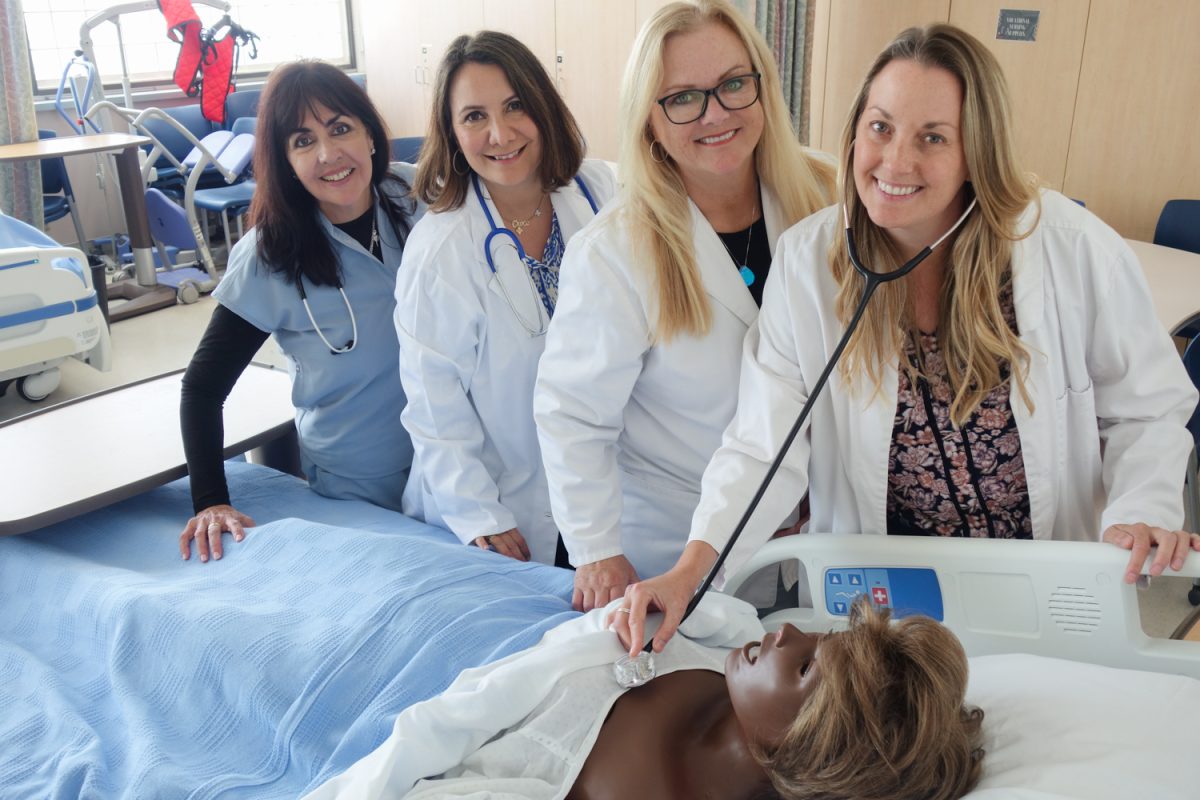Last year on Friday, Dec. 15 the newest cohort of nursing students in the nursing program graduated with an Associate Degree in Science in Nursing (ADN) with a 100% passing rate for the NCLEX-RN exam for the quarter ending on March 31. The exam, or the National Council Licensure Examination for Registered Nurses, is the final requirement for nursing students to become registered nurses in the U.S. and Canada.
ADN Director and Department Chair Mary Sullivan expressed her pride in her 35 students who passed the exam, especially since the class that graduated was the last class that was solely remote. Now, she looks forward to bringing the class back on campus.
Although Sullivan has been a great resource for her students, there were some concerns in the community when she took over. One being that the program would take a nosedive because of many faculty members leaving due to COVID-19.
“We had a huge change in faculty, but with our experience being here 17 years and we’ve both been nurses for a long long time, 30 plus years,” Sullivan said, referring to her and her “other half” ADN Assistant Program Director Linda Macias. “We both have a masters degree in nursing education and we’re 100% dedicated to the success of these students.”
The success of her students is evident through the messages she receives from her graduates moving onto the next big step in their career.
“The students who do graduate from our program have an allegiance and they are so proud and want to continue to see our program succeed,” Sullivan said. “Now the new grads are out there, are emailing me and texting and telling me how it’s apparent how prepared they are.”
Sullivan shared her gratitude for the class and how it summarized everything the students had learned throughout their semesters in time for the exam, as well as the use of the Lompoc and Cottage hospitals where instructors help the students apply what they learn in the classroom at the bedside.
Macias, who had been in the program for 17 years and at Cottage Hospital for 43 years, shared how Sullivan went “above and beyond,” and got a preparation class founded by the City College foundation because the students are so busy with their work in school and do not have so much time outside of class to study and prepare themselves.
The in person class, Assessment Technology Institute (ATI) Live Review, was three days long with eight hour days providing breakfast and lunch. ATI Next Generation NCLEX, who is an academic partner with the program, helped the students understand the new way of completing the exam.
An instructor from across the country was able to guide the students through practice exam questions for the three days, and according to both Sullivan and Macias, was very impressed with the students’ interactions and answers to the questions.
“She did such a prep with them to get ready to take the test that they wanted to take it,” Macias said.
Alongside the class, the students complete their lessons in preparation for their final tests, according to Macias.
“You get your theory, you take that theory to the lab, you practice that skill, you put a day together learning how you’re going to treat a patient, and then you go do your delivery of care in the hospital with people,” she explained.
The students also have instructors following along the entire clinical trials, being part of the actual medical team for each case.
Macias makes her students journal every day in class, encouraging them to look back to their entry from day one and compare their skills to where they are now.
“From what they learn on their first day to where they are now, they’re pretty good,” she said.
Four semesters back, the program would only accept vocational nurses (VNs) and not regular generic students. This graduating class had 18 licensed vocational nurses (LVNs) and 20 generic students.
Already LNVs come in after the first semester and do part of a second semester and a complete third and fourth, since they are already VNs. When they graduate from the program they become registered nurses (RNs). The generic students start from semester one, these students already possessing a degree in nursing science.
Justin Nachazel graduated in December of 2023, and is now working in the Definitive Observation Unit (DOU) at St John’s Regional Medical Center in Oxnard.
Before attending City College, Nachazel had 10 years as a paramedic under his belt; eight years as a firefighter and two years in search and rescue.
“As of right now, I would like to get a handle on being an efficient and well rounded nurse before I really decide what direction I would like to go,” Nachazel said. “Whether that be going to the ICU, going to the cath lab, or the emergency department.”
After being in the program for nearly two years, Nachazel and his classmates connected throughout the classes, despite living in Camarillo and having to commute when he was a student.
“You form a lot of deep friendships in nursing school and it can be difficult to maintain a lot of those contacts when you’re in your new residency program as a new grad nurse and you’re learning how to do skills the way they would want you to,” Nachazel shared.
When the LVNs joined the program after the second semester, the students turned into a “big, happy family,” according to Nachazel.
“I think our class ended up finding at least one person if not a group that they developed a strong relationship with that ultimately helped them get through the program successfully, allowing them to lean on one another,” he said.
According to the new graduate, something that stuck with him during the first day of class was something Sullivan said.
“She said, ‘It’s your responsibility to change nursing culture for the better,’ and that kind of stuck with me throughout the entire program and still today as a registered nurse,” he said. “I understand that it’s our responsibility to become good strong nurse, but also to change and evolve the culture of nursing and change and evolve the practice of nursing,”
I did feel well supported by the administration. I never once felt like the program was out to fail me, I always felt like the program was there to help me succeed and I am sure that all my classmates feel the same way.”
Nachazel started his employment at St John’s Regional only two months ago, but already has received high praise, feeling prepared for the new position with his new graduate class. Although feeling there is a learning curve when becoming a nurse, even after graduating and becoming a licensed registered nurse, Nachazel recalls the curve being less steep after attending City College.
“The very first day you start the program, it feels daunting,” he said. “And then toward the ending of semester four, it’s even worse, it’s even more daunting. You have to graduate and perform. Slowly you start to feel more comfortable. But I am very thankful and very glad that I went through the program that I did because I don’t feel like the hill is insurmountable.”










![Milton Alejandro Lopez Plascencia holds a flag showcasing the United States and Mexico on Feb. 7 in Santa Barbara, Calif. “It’s heartbreaking to see what is happening all across the country,” Lopez Plascencia said. “I [want] my voice to be heard by the community.”](https://www.thechannels.org/wp-content/uploads/2025/05/MGSImmigration-1-1200x800.jpg)




